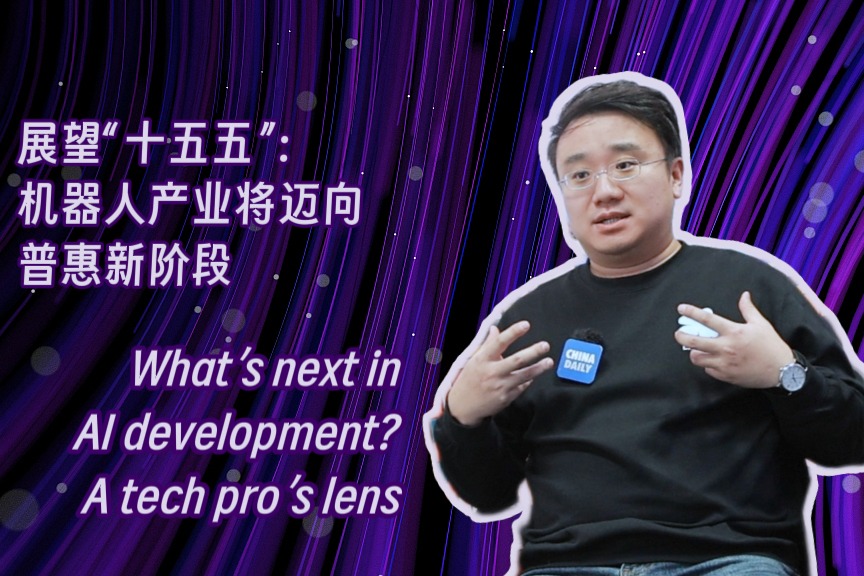The power of culture: Insights into Baidu's AI revolution
chinadaily.com.cn | Updated: 2021-06-16 14:54
1. Changing idea or job
In retrospect, Baidu's efforts to renovate the company culture in order to be more adaptive and innovative originated from critical challenges in the mobile Internet era, which perhaps Microsoft has more similarities. Both companies were mighty leaders in the supremacy of the PC but they moved slowly and missed market opportunities when the mobile Internet rose. Baidu's position as a core information hub has declined in the mobile era.
It's true that the search engine was a very good business model in the PC era, but it was very simple and had a relatively short value chain. People put keywords in the search box to find information free on the Internet as Baidu works mainly as a connector in the process, driving traffic to relevant websites. In the mobile era, information is less on the webpages and more created and stored by apps, so Baidu's role to connect web information became increasingly a mission impossible.
"Unfortunately, at that time, Baidu's search engine service had a good business performance. So people were not aware of the risks (from the rise of mobile Internet) and thought everything was just fine," said Cui.
Business models in the mobile era are rather sophisticated and have a more complex value chain, which naturally requires a company to have a proportionate management style and organizational capabilities. But Baidu was then unprepared since its business model was set to serve a short value chain, according to Cui.
At that time barriers also included an ineffective organizational structure that failed to pool Baidu's strengths together. The company had a VP responsible for the basic search engine service, a manager in charge of the Baidu app, another to lead mini-programs, another VP for business and sales, and different person for technology. This loose structure made it impossible to cope with the requirements of a long value chain. Facing such challenges, operationally and in organization, the company had to start a massive restructuring.
From Awareness to Action
In a meeting of directors two years ago, Baidu developed a clear strategy for the mobile era. The hard truth shared by participants was that the demise of PC also announced the death of the previous free and open web, so Baidu had to build new infrastructure and identify business areas to make an impact. It was also agreed that Baidu needed to construct an entire mobile ecosystem to enhance the user experience, diversify its income streams and dramatically renovate its role from a shaky information connector in the past to an integrated platform offering closed-loop services horizontally and vertically, or the X+Y strategy of the company's Mobile Ecosystem Group (MEG).
After building awareness of and support for the new thinking first among management, Baidu then moved decisively to shift staff work priorities from "participating in the change" to "redesigning business models that have become obsolete". Baidu is still an information connector but in a brand new form. In illustrating this new connection, Baidu Executive Vice President Shen Dou said content was stored on third-party platforms in the past but now Baidu also provides services such as hosting the newsfeed network Baijiahao, so content creators are more interested in growing their users and engaging with the audience through other Baidu products.
In the X+Y strategy, the horizontal axis refers to user portals that meet diverse needs in different scenarios, and the vertical axis is mainly aimed at expanding the range of content and services offered to users. Baidu believes this will help build a stable, healthy and sustainable business model that is completely different from its past role of simply connecting information.
Integrating the user experience with business goals
For a big company like Baidu, it's necessary to form the right culture to turn the idea into reality on the ground. Ten years ago, Baidu's free services to end users and for-profit business offerings were always locked in a fight. It seemed either users were pissed off or business interests had to sacrificed.
But the strategic business layout of X+Y offers a new chance to accommodate the different concerns. Baidu connects creators, service providers and merchants directly with relevant users in the ecosystem, calling it a humanization process. Baidu also provides users with closed-loop services.
As an example of the progress, a veteran employee in the app team said it was usually a lengthy process with layers of approvals to make change within the Phoenix Nest advertising system. In the contrast, now the business director also fully considers how to display search results, perhaps in the form of providing services to users along with customer services and user feedback, all part of a decidedly holistic approach.
In advocating the mindset of taking both users and businesses to heart, Baidu's management has underlined the key message in the words of "all staff need to change their minds, especially the managers, otherwise they will be replaced". When Baidu's search arm was transformed into MEG in May 2019, Shen Dou stressed the importance of "having the courage to accept the transfer." Senior engineers from three isolated fields became more open-minded after completing the rotation.
To summarize, the period from January 2019 to April 2020 saw a complete process of adaptation to the new strategy and company culture. It started from the management team's call for a change of mindset, made clear in the goal of building an ecosystem and diversifying revenue, undertook massive measures such as rotation and reshuffling to promote wider acceptance of the new idea, shaped a culture in line with new strategic objectives, and finally ended with the rollout of the X+Y strategy.
Studies of successful culture changes show one thing in common – business leaders need to clearly bind together corporate culture, strategy and business objectives. Otherwise, a strategy that runs counter to the company's culture is bound to fail, and vague culture value can be difficult for employees to embrace. Baidu is certainly a success story in this sense.
























